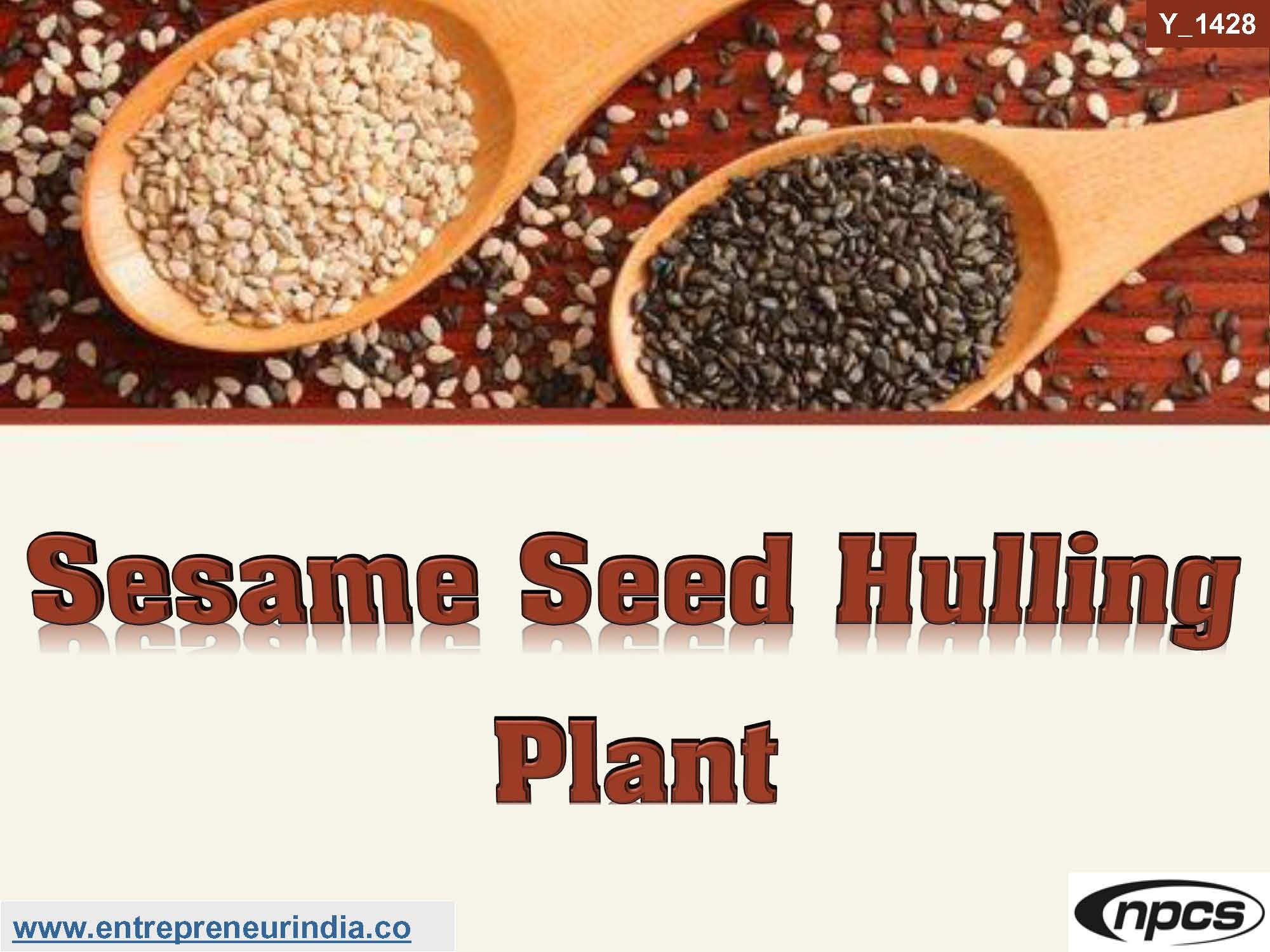
Setting up a Sesame Seed Hulling Plant is a lucrative opportunity in the food processing and export industry. With global demand for hulled sesame seeds rising due to their use in bakery, confectionery, tahini, and oil extraction, this business offers high returns on investment. India is one of the top producers and exporters of sesame seeds, and value-added processing through hulling greatly enhances marketability. A sesame seed hulling plant helps increase shelf life, improve appearance, reduce bitterness, and comply with international food safety standards, making it an essential venture for agro-industrial entrepreneurs.
What Makes Sesame Seed Hulling Profitable
The hulling process involves removing the outer husk or seed coat from raw sesame seeds to produce clean, white, and premium-quality kernels. These hulled seeds are in high demand in countries like the USA, Japan, Korea, Middle East, and Europe. The value of hulled sesame seeds is considerably higher than unhulled seeds, making the margin attractive for processors.
By establishing a Sesame Seed Hulling Plant, businesses can cater to the growing food and oil processing industries. Hulled seeds are widely used in making tahini paste, sprinkled on bread, crackers, confectionery products, salads, and Asian cuisines. This value-added product enjoys consistent demand, and its export potential makes the business extremely viable.
In addition, a sesame seed hulling plant reduces wastage and increases yield through mechanized processing, boosting efficiency and profitability. The business aligns well with India’s agro-export focus and fits under MSME or agro-processing promotion schemes.
Process Involved in Sesame Seed Hulling
The hulling process in a sesame seed hulling plant includes multiple steps to ensure purity, hygiene, and maximum yield. It starts with cleaning the raw seeds to remove dust, stones, and other impurities using vibrating sieves and destoners. The cleaned seeds are then soaked in water or an alkaline solution to loosen the hull.
After soaking, the seeds are passed through mechanical dehullers that separate the husk from the kernel. The hulls are separated through washing and flotation techniques. The dehulled seeds are then dried in hot-air dryers to reduce moisture content. Finally, polishing machines enhance the shine and appearance of the hulled seeds before packing.
A modern sesame seed hulling plant uses automation for consistency and reduced labor dependency. Quality control is maintained through moisture monitoring, optical sorters, and metal detectors to ensure food-grade safety.
Machinery and Infrastructure Requirements
To set up a Sesame Seed Hulling Plant, certain machinery and equipment are required for each processing stage. These include:
-
Pre-cleaner and destoner
-
Soaking tanks or automatic soaking units
-
Dehulling machine (rubber roller or abrasion type)
-
Separator and decanter system
-
Drying system (hot air or rotary dryer)
-
Seed polisher
-
Grader and sorter
-
Packaging unit (semi-automatic or fully automatic)
The infrastructure should include raw material storage area, processing room, drying area, packaging zone, and finished goods warehouse. The plant layout must also consider clean water supply, energy-efficient power systems, and wastewater treatment systems.
A small to medium-sized sesame seed hulling plant can be started with 1–3 tons per day (TPD) capacity and can later scale up to 10 TPD or more depending on market demand and export orders.
Investment and Cost Estimation
Starting a Sesame Seed Hulling Plant requires an estimated capital investment between ?25–50 lakhs for a small to medium unit. The major cost components include:
-
Machinery and equipment: ?15–25 lakhs
-
Land and building setup: ?5–10 lakhs (or rented space)
-
Working capital (raw materials, labor, utilities): ?5–10 lakhs
-
Packaging materials and branding: ?2–3 lakhs
-
Licensing, legal fees, and contingencies: ?1–2 lakhs
Profit margins in sesame hulling are attractive due to the value-added nature of the product. A unit can expect margins of 20%–30%, with ROI achievable within 1.5 to 2 years based on volume and quality.
By selling directly to exporters, food companies, or through a branded retail pack, the sesame seed hulling plant can create multiple revenue streams.
Licensing, Compliance, and Certifications
To operate a Sesame Seed Hulling Plant legally and successfully, several licenses and registrations are necessary:
-
Udyam (MSME) registration
-
GST registration
-
FSSAI license (Food Safety and Standards Authority of India)
-
Factory license (if applicable)
-
Pollution Control Board clearance (for wastewater)
-
Export-import code (IEC) for export business
-
ISO 22000 or HACCP certification for food safety
Export-focused units may also pursue APEDA registration and comply with international standards like FDA (USA) or BRC (UK) for smoother overseas trade. Ensuring proper labeling, hygiene, and traceability also builds trust among buyers.
Adherence to good manufacturing practices (GMP) and maintaining a clean, semi-automated environment in the sesame seed hulling plant ensures premium product quality and longer shelf life.
Marketing and Sales Strategy
The success of a Sesame Seed Hulling Plant also depends on an effective sales and marketing approach. Hulled sesame seeds are mainly sold in the following forms:
-
Bulk export in 25–50 kg bags
-
Retail packaging in 200g to 1kg pouches under private labels
-
B2B supply to tahini manufacturers, bakeries, health food brands
-
White-label partnerships with food exporters and superstores
Online platforms like Alibaba, Indiamart, Amazon (B2B), and export portals help in client acquisition. Offline networks through food trade expos, agro exporters, or wholesalers can also boost distribution.
Creating a brand identity, sustainable packaging, and highlighting product purity or certifications (non-GMO, organic, gluten-free) increases the value of the product in niche and premium markets.
Sustainability and By-product Utilization
A Sesame Seed Hulling Plant can contribute to sustainability by minimizing waste and utilizing by-products. The husk or hull removed during hulling can be used as animal feed, biomass fuel, or organic compost.
Installing water recycling systems and solar dryers can improve environmental performance. Using biodegradable packaging and sourcing sesame from organic or contract farmers also adds value to the brand and attracts conscious consumers.
Sustainable sesame processing opens new doors for eco-labeling, carbon credit eligibility, and access to special export schemes under organic farming or green industry.
Growth Potential and Business Expansion
The global sesame seed market is expect to cross $10 billion in the coming years, driven by demand from bakery, health foods, and vegan diets. India, being a major producer, offers significant potential for growth in sesame seed value addition.
An established Sesame Seed Hulling Plant can expand into:
-
Export of value-added tahini paste or sesame snacks
-
Oil extraction from hulled seeds
-
Branded retail packs for organic or gourmet markets
-
Ready-to-use mixes with roasted sesame, flax, chia, etc.
-
Custom sesame products for bakeries and restaurants
By integrating forward into sesame-based consumer products or backward into contract farming, entrepreneurs can diversify income and strengthen supply chain control.
Conclusion
Setting up a Sesame Seed Hulling Plant is a smart move for agropreneurs seeking value addition, global demand, and high margins. With proper investment, clean processing, quality assurance, and a strong distribution strategy, this business can yield consistent returns and scalable growth.
Whether supplying to bulk buyers or retail markets, the sesame hulling industry is align with food trends, export potential, and sustainable practices. Entrepreneurs who focus on innovation, compliance, and brand trust can turn sesame into a goldmine of business opportunity.
Niir Project Consultancy Services
An ISO 9001:2015 Company
106-E, Kamla Nagar, Opp. Spark Mall,
New Delhi-110007, India.
Email: npcs.ei@gmail.com , info@entrepreneurindia.co
Tel: +91-11-23843955, 23845654, 23845886, 8800733955
Mobile: +91-9811043595
Website: www.entrepreneurindia.co , www.niir.org





